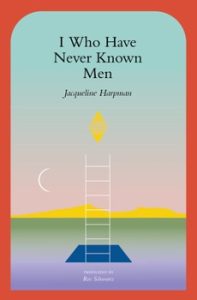Transit Books
Review by Gabriel Tanguay Ortega

I don’t like the amount of time I spend on social media, though it does turn me on to books I might never have come across. First published in French in 1995 and recently republished in the US, the late Jacqueline Harpman’s I Who Have Never Known Men is finding its moment right now, driven by reviews on Instagram and TikTok.
The premise of this speculative-dystopian novel is gold: thirty-nine women are kept in an underground bunker, in a cage, under the perpetual surveillance of six male guards who don’t communicate or interact with them. The women are provided only enough food, clothing, and medicine for basic survival, and the guards enforce Draconian prohibitions against physical contact. The women don’t know why they’re being imprisoned. They don’t know how they ended up in the bunker. They retain only foggy memories of their lives before, but are sure some cataclysmic event precipitated their captivity. The guards do not touch them, walking the perimeter of the cages in shifts of three. The women eat, sleep, defecate, and wash with zero privacy. They form alliances and make adversaries, and pass the hours by thinking over new ways to cook and perform various domestic chores.
They have one way of measuring time, through a young girl who has no memory of life before captivity. Precocious and unnamed, she is our narrator, and her fellow prisoners watch her growth as a way of marking time.
The novel unfolds through the girl’s eyes, entering into her tortured psyche as she navigates her existence, not privy to things like airplanes, fruit, or romance—things the other women refer to as they talk among themselves. She feels like an outsider among the women, over time finding a few meaningful allies, while maintaining an inner life where she devises her own methods of keeping time and stimulating her imagination. She asks herself the same questions: Where are we? Why are we here? What is happening? Who are the men guarding us? Who am I?
And then one day an alarm sounds, and the guards hastily evacuate, leaving the keys to the cage in our narrator’s grasp. At once tenacious and brave, she urges the shocked, confused, and reticent women up and out of the bunker—the guards having somehow vanished into thin air—to “freedom.”
The freedom they find above ground—our narrator’s first time ever—is on an empty, desolate plain. It’s not long before the novelty of fresh air, rain, and a rushing river wears off and the women must decide what comes next: —stay near the food stores in the bunker, or go somewhere else? But where? What are they looking for?
This is a story of how a band of women survives total subjugation without losing their own humanity, and then how they navigate a strange, vacant world bearing no resemblance to the one they knew before. For they don’t encounter other humans, animals, or new terrain. They just keep moving, and on their travels they discover bunkers like the one they fled, full food stores, absent of guards, equipped with familiar cages, each one filled with the corpses of unknown captives who were not fortunate to escape.
Relationships deepen, they build houses and make clothing, and our narrator becomes one of the leaders of this nomadic family. As the years pass some of the women die from age, some from illness, and our narrator digs their graves, experiencing sadness in addition to the unbridled freedom in her pursuit of survival.
At a brief 164 pages, this novel is a stark yet superb exercise of narrative control, equally unsettling and fascinating, worryingly plausible. Harpman provides just enough detail for us to draw our own conclusions about the cataclysmic event that occurred and what purpose these women served in captivity. We relate to our narrator as she reconciles her place as heir apparent to a vast and empty world.
With touches of Atwood’s uncanny dystopian world-building and Orwell’s strikingly clear language, I Who Have Never Known Men reads like an epic fairytale about relationships, resistance, and the remarkable endurance of the human spirit. It’s a feminist piece, a cautionary tale, and a story that readers will never forget.
